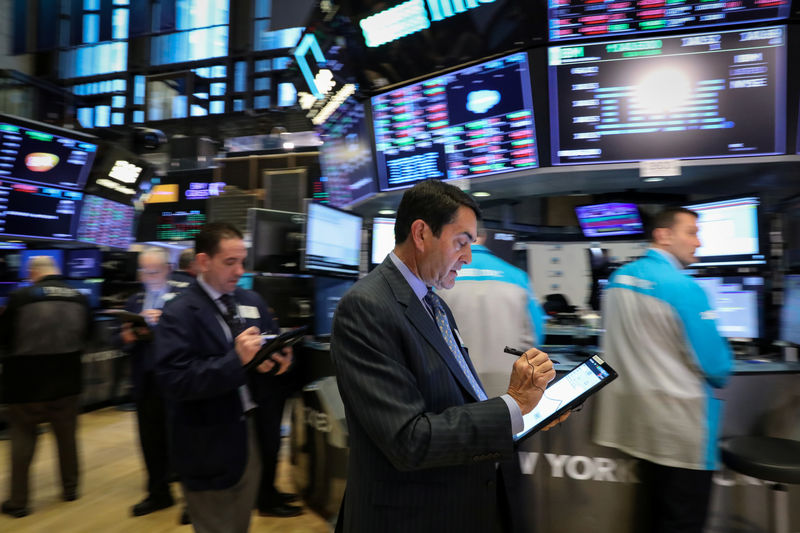By Lewis Krauskopf
NEW YORK (Reuters) - Second-quarter strength in U.S. healthcare stocks is almost as reliable for Americans as warming weather and the start of baseball season. This year, however, the already-lagging sector may struggle to sustain any kind of rally.
Healthcare shares are suffering from a broad market rotation favoring other groups, market-watchers say, as well as from policy-related uncertainty, although positive earnings reports in the coming weeks could provide temporary relief.
Federal government pressure to lower the cost of healthcare, and in particular prescription drug prices, for consumers continues. And as the 2020 U.S. presidential election campaign heats up, that focus is likely to intensify with numerous Democratic candidates keeping it front and center, which could heighten volatility for the group's shares.
That could upend a traditional second-quarter trend. The overall market tends to be more rocky starting in the period, so investors become more defensive with their portfolios, benefiting groups such as healthcare that are seen as safer bets, according to CFRA strategists.
To some degree, healthcare is suffering from its own success. Healthcare was the best-performing major S&P 500 sector last year, when the overall stock market stumbled.
As the market rebounded this year, fueled by the Federal Reserve signal that it was not inclined to raise interest rates, optimism regarding global trade tensions and better-than-feared economic data, investors piled into laggards.
That favored sectors such as technology and industrials, while healthcare's strength last year stemmed partly from its allure as a more defensive bet.
"When the Fed shifted their stance in early January, it totally changed the backdrop," said Walter Todd, chief investment officer at Greenwood Capital in South Carolina. Investors sold healthcare stocks and "started buying the most beat-up names," he said.
Earnings could provide a boost, starting on Tuesday. Results are due from diversified healthcare manufacturer Johnson & Johnson (NYSE:JNJ) and insurer UnitedHealth Group Inc (NYSE:UNH), the biggest and third-biggest U.S. healthcare companies by market value, respectively.
Healthcare companies in aggregate are expected to increase first-quarter earnings by 4.4% from a year earlier, according to IBES data from Refinitiv. That is the second-biggest rise expected of the 11 major sectors and a stand-out as earnings for the overall S&P 500 are expected to drop 2.1%.
“If the healthcare companies are reporting good earnings and the stocks continue to underperform, then you start to get some valuation support,” said James Ragan, director of wealth management research at D.A. Davidson.
The healthcare sector has climbed 72% of the time during the second quarter, according to CFRA, which looked at 30 years of data. That compares to 62% for the overall S&P 500, and is a higher rate than the other sectors. The healthcare sector on average has gained 3.6% in the second quarter, compared to 2.2% for the S&P 500, according to CFRA.
But the clouds that have rained on healthcare's performance so far in 2019 are not expected to dissipate soon.
The S&P 500 healthcare sector has climbed 4% year to date, well below the nearly 16% gain for the overall S&P 500, as the benchmark index nears record highs.
'A BAD WEEK'
Uncertainty over policy is particularly punishing shares of health insurers and other services companies, investors say. That includes proposals to change the drug-rebate system under which drugmakers refund money to insurers and pharmacy benefit managers, and the prominence of Senator Bernie Sanders and other left-leaning presidential candidates who support "Medicare for All" government-run healthcare.
Last week alone, the S&P 1500 managed healthcare care index tumbled 10%, including steep drops for insurers Anthem (NYSE:ANTM) Inc and UnitedHealth.
“It’s a bad week where all these things have kind of combined and people just want out,” Jeff Jonas, a healthcare portfolio manager with Gabelli Funds, said on Friday.
Shares of many large pharmaceutical and biotech companies - which comprise about half the sector - have struggled this year. Biogen Inc (NASDAQ:BIIB) shares tumbled after the company's closely-watched experimental Alzheimer's disease medicine failed in clinical trials, the kind of event that analysts say scare off investors from drugmaker shares broadly.
Those stocks have largely avoided the pain doled out to services shares from drug pricing and other policy concerns, but that could change. "I am not sure if we are done with the news flow regarding that topic," said Thrivent Financial healthcare analyst David Heupel.
Shares of life-science tool and healthcare equipment companies, viewed as relatively immune from policy concerns, have outperformed their healthcare brethren this year. But they also now trade at expensive valuations compared to their five-year averages.
After selling off to end 2018, many small- and mid-cap biotech stocks have rebounded this year, making valuations less cheap than they were.
“I’d love to say that healthcare is going to claw back a lot of this underperformance," said Jeffrey Schulze, investment strategist at ClearBridge Investments.

But, he adds, political risk and his expectation that other market groups will lead "when it’s clear that global growth is going to come, may weigh on the sector's prospects.”